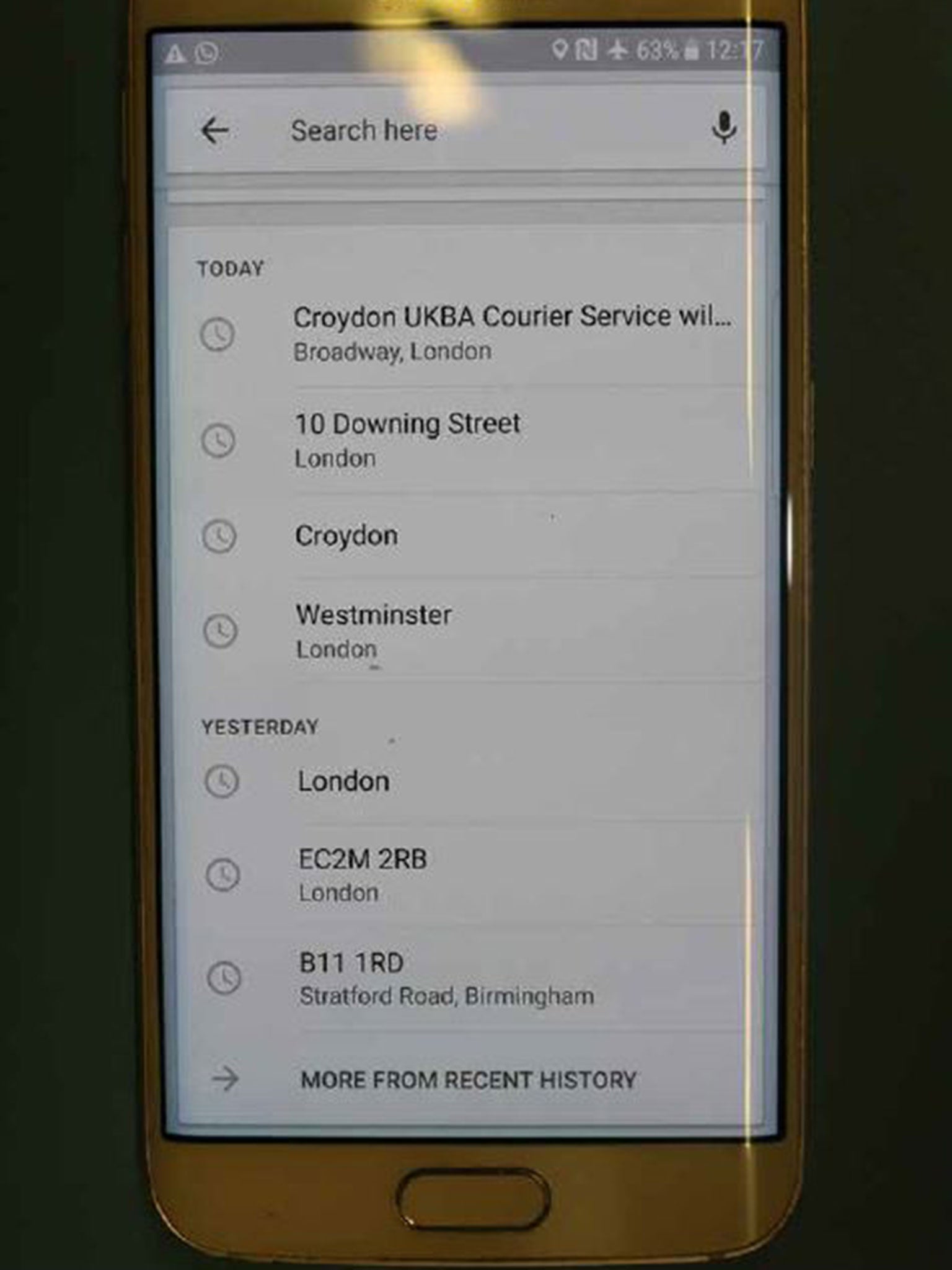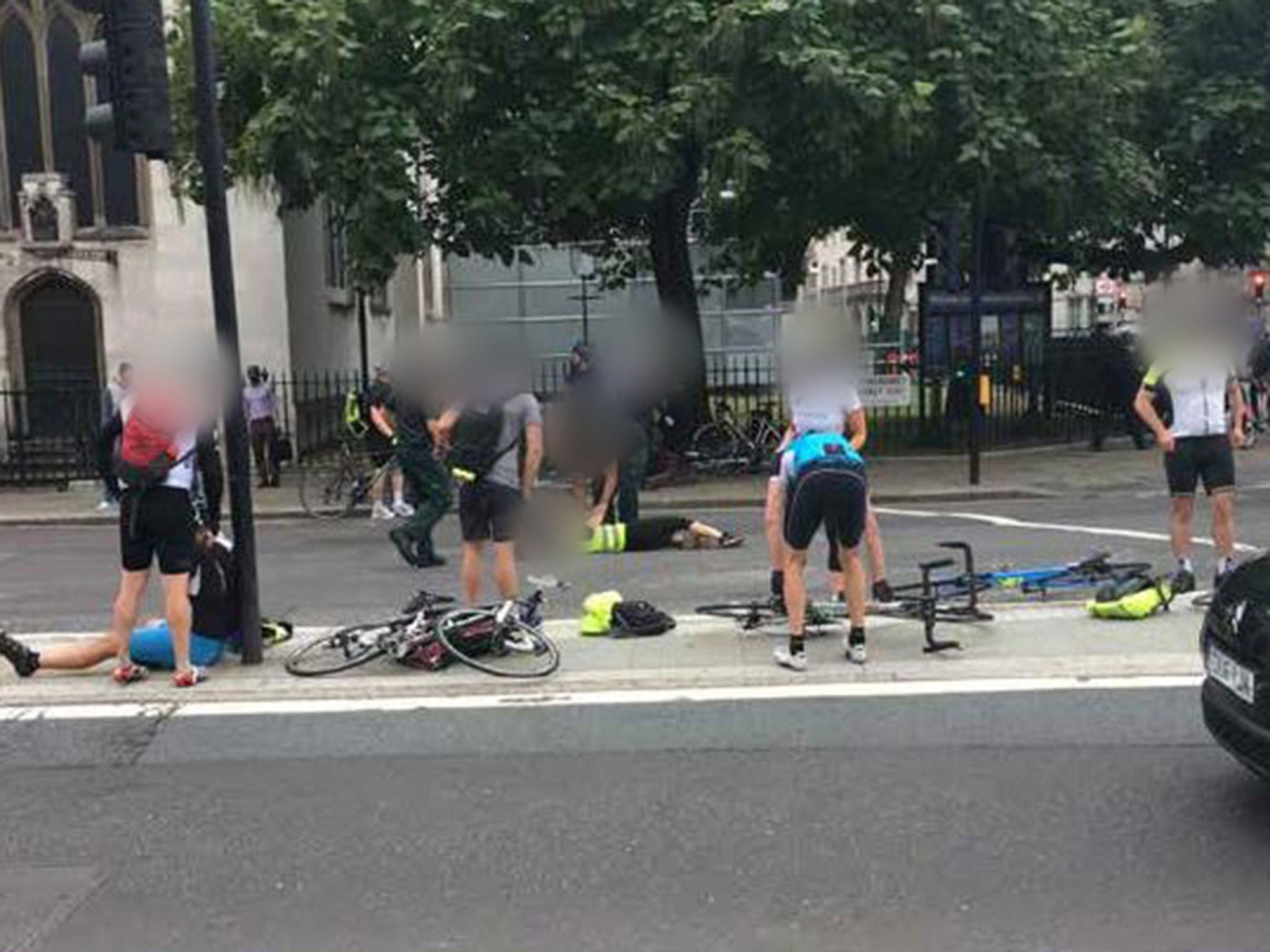Westminster crash: Salih Khater jailed for life over terror attack outside parliament
Police found no extremist material or links to terrorist groups

A man who ploughed his car into cyclists outside the Houses of Parliament has been jailed for life committing a terror attack, despite investigators finding no evidence of extremism.
Salih Khater, 30, claimed the crash in August 2018 was an accident after he got lost on the way to a London embassy.
Police found no evidence of any links to terrorist groups, or any extremist material at Khater’s home or on his electronic devices.
But prosecutors argued that the crash was “premeditated and deliberate”, and that the fact Khater drove towards police officers outside parliament indicated it was a terror attack.
His defence lawyer, Peter Carter QC, argued that his conviction for attempted murder could not be found to have a terrorist connection.
He told a judge at the Old Bailey: “Had there been any evidence of any link between this man and a terrorist organisation or terrorist individual, or had there been any connection that he had expressed any interest in or showed any desire to pursue any link to terrorism it would have been before your ladyship.
“There is not. The lack of evidence is not a proper basis for drawing a conclusion there is evidence of a terrorist connection.”
But Mrs Justice McGowan found Khater had deliberately copied other terrorists as she jailed him on Monday for life with a minimum term of 15 years.
“Your undoubted intention was to kill as many people as possible and by doing so spread fear and terror,” she said. “You replicated the acts of others who undoubtedly have acted with terrorist motives. You deliberately copied those others ... by extraordinary good fortune no deaths or life-threatening injuries were caused.”
The crash followed the Westminster attack in March 2017, when Islamist Khalid Masood killed four victims with a car on Westminster Bridge before stabbing a police officer to death outside parliament.
Vehicles were also used in the Isis-inspired London Bridge attack and far-right Finsbury Park attack, both in June 2017.
But unlike other terrorists, Khater did not carry a secondary weapon in his vehicle and made no known statements of religious or political beliefs.
Mrs Justice McGowan said the crash was an “attack on strangers and police officers at the seat of democracy in this country”.
“You are dangerous in that you present a significant risk of causing serious harm to the public in the future,” she told Khater.

“Even acting alone, you acted for a terrorist purpose. All the evidence is consistent with that conclusion.”
She admitted there was no evidence of a link between Khater and no extremists, or that he had expressed extremist views himself, but said there was “no evidence of any other motivation”.
The Old Bailey heard that Khater drove from Birmingham to London in the early hours of the morning after searching for directions to Downing Street, Westminster and the Croydon UKBA Courier Service.
He was caught on CCTV driving around central London carrying out alleged reconnaissance and looping around Parliament Square four times before launching the attack shortly after 7.30am.
The court was played footage of Khater ploughing his Ford Fiesta through a group of cyclists waiting at a traffic light, before swerving towards a barrier manned by uniformed police officers at 30mph.
They dived out of the car’s path as it accelerated towards them in a security lane, while injured cyclists lay scattered in the road screaming in pain. Several needed hospital treatment.
As armed police removed Khater from the car after it crashed into barriers, he confirmed he was acting alone but failed to explain himself.
Alison Morgan QC, prosecuting, had accused Khater of carrying out a “premeditated and deliberate attack on civilians and police officers in Parliament Square”.
She admitted his motives were unclear and “nothing of significance” was found at his home, but told the jury that there was “no credible explanation” for the crash other than it being a “calculated and targeted attack”.
Khater, of Highgate Street in Birmingham, claimed he drove to London to obtain a visa from the Sudanese embassy.
Giving evidence, the defendant said he wanted to return to Sudan to visit his sick mother and had googled Downing Street and Westminster in his bid to find his way around central London.

He told jurors he “got lost” and “panicked” when he crashed into cyclists and was trying to pull over when he hit barriers in the security lane outside parliament.
“I remember something made me panic,” Khater said. “The car was not in my full control at the time.”
Prosecutors said the manoeuvres could not have been accidentally performed and there was no fault with his Ford Fiesta.
The jury deliberated for two days before rejecting Khater’s explanation and finding him guilty of two counts of attempted murder in July.
Commander Richard Smith, head of Scotland Yard’s Counter Terrorism Command, called Khater an “extremely dangerous individual”.
“It was our view that this attack was carried out with a terrorist purpose and the sentence confirms this,” he added. “My thoughts are with all the victims of this terrible attack. Many were left with physical and psychological injuries, which are still impacting on their lives today.”

In the immediate aftermath of the attack, friends of Khater had expressed shock and insisted he was a “very good man”.
Nassar Mahmood, a trustee at the Birmingham Central Mosque – which sits near the attacker’s home – said he did not worship there and enquiries suggested he was not a “fervent” Muslim.
A friend of Khater told The Independent he was “a normal Muslim, he’s not radical – he prays five times a day and that’s it, he doesn’t wear religious clothing”.
The court heard that he was born in Darfur, Sudan, but arrived in the UK in 2010 and successfully claimed asylum after claiming to have been tortured because of links to the country’s Justice and Equality Movement.
Khater lived in different properties in Birmingham, including above an internet cafe where a patron noticed that his “mood changed” in the months before the alleged attack.
Khater, who was not known to MI5 or counterterror police, had been studying accountancy at Coventry University, but failed his exams and was asked to leave at the end of the 2018 academic year.
During the same period, prosecutors said he displayed “signs of paranoia” about the actions of British authorities, writing an email to Jeremy Corbyn’s office on 24 May 2018 about an “event” which he believed involved the intelligence service.
Khater described himself as a shop manager on his Facebook page, which also indicated a liking for Celine Dion and Rihanna.
The “about” section read: “In past I’m great but now I say I don’t no [sic].”
